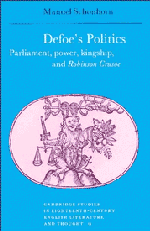Book contents
- Frontmatter
- Contents
- Dedication
- Preface and acknowledgments
- A note on attributions
- List of abbreviations
- Introduction
- 1 Defoe, dissent, and monarchy
- 2 Defoe's Reflections Upon the Late Great Revolution and the political languages of 1689
- 3 Defender of the king, 1689–1701
- 4 From the death of William III to Jure Divino, 1702–1706
- 5 Jure Divino
- 6 The politics of Robinson Crusoe
- Select bibliography
- Index
Preface and acknowledgments
Published online by Cambridge University Press: 19 August 2009
- Frontmatter
- Contents
- Dedication
- Preface and acknowledgments
- A note on attributions
- List of abbreviations
- Introduction
- 1 Defoe, dissent, and monarchy
- 2 Defoe's Reflections Upon the Late Great Revolution and the political languages of 1689
- 3 Defender of the king, 1689–1701
- 4 From the death of William III to Jure Divino, 1702–1706
- 5 Jure Divino
- 6 The politics of Robinson Crusoe
- Select bibliography
- Index
Summary
With Defoe we have all too often read the present into the past and judged and commended him because he anticipated our future rather than because he mirrored his present and his past. The following study presents a Defoe whose political ideas, while they were developed in the ideologically dense post-Revolution decade following the Allegiance controversy, rested on a firm Old Testament foundation. De-mythologizing the “Lockean” Defoe, this study returns him at the same time to the centrality of seventeenth-century political thought, with its rich biblical and constitutional contexts. Defoe has also been misinterpreted because we have failed to see his works as both propaganda and political theory. To understand Defoe rightly, he must be viewed as a writer concerned not only with this or that particular point of political policy, to paraphrase G. H. D. Cole, but also with the origins of government, the reasons for the successes and failures of political society, the ultimate principles of political obligation, and the nature of leadership at a historical crisis in western culture.
In this challenge to the traditional understanding of the “radical” Defoe, the “populist” Defoe, and his greatest political fiction, Robinson Crusoe, I hope that I will be considered as more than a certain meddlesome spirit, which, as Washington Irving wrote in his Life and Voyages of Christopher Columbus, “goes prying about the traces of history, casting down its monuments, and marring and mutilating its fairest trophies.”
- Type
- Chapter
- Information
- Defoe's PoliticsParliament, Power, Kingship and 'Robinson Crusoe', pp. ix - xPublisher: Cambridge University PressPrint publication year: 1991

